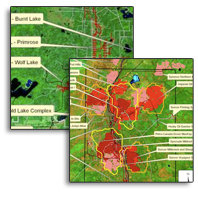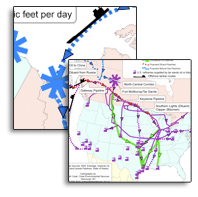Tar Sands 101
The Tar Sands "Gigaproject" is the largest industrial project in human history and likely also the most destructive. The tar sands mining procedure releases at least three times the CO2 emissions as regular oil production and is slated to become the single largest industrial contributor in North America to Climate Change.
The tar sands are already slated to be the cause of up to the second fastest rate of deforestation on the planet behind the Amazon Rainforest Basin. Currently approved projects will see 3 million barrels of tar sands mock crude produced daily by 2018; for each barrel of oil up to as high as five barrels of water are used.
Human health in many communities has seriously taken a turn for the worse with many causes alleged to be from tar sands production. Tar sands production has led to many serious social issues throughout Alberta, from housing crises to the vast expansion of temporary foreign worker programs that racialize and exploit so-called non-citizens. Infrastructure from pipelines to refineries to super tanker oil traffic on the seas crosses the continent in all directions to allthree major oceans and the Gulf of Mexico.
The mock oil produced primarily is consumed in the United States and helps to subsidize continued wars of aggression against other oil producing nations such as Iraq, Venezuela and Iran.
To understand the tar sands in more depth, continue to our Tar Sands 101 reading list
Politics Stamps Out Keystone XL Pipeline, Yet It Seems Likely to Endure
Politics Stamps Out Oil Sands Pipeline, Yet It Seems Likely to Endure
By JOHN M. BRODER and DAN FROSCH
Published: December 23, 2011
WASHINGTON — The Obama administration confirmed this week that a provision in the payroll tax bill requiring a quick decision on the proposed Keystone XL oil pipeline from western Canada to the Gulf Coast will probably lead to cancellation of the project.
Reflections on Apartheid Oil
Reflections on Apartheid Oil
by Media Co-op
December 21, 2011
The Apartheid Oil series, which was originally published here on the Media Co-op, has created waves of discussion throughout the activist community and beyond. As a follow up to the five pieces that were part of the Apartheid Oil project, the Media Co-op did a follow-up interview with author Macdonald Stainsby.
Media Co-op: Is there a religious element to arguments in favour of developing these oil shale deposits?
'Secret' Environment Canada presentation warns of tar sands' impact on habitat
'Secret' Environment Canada presentation warns of oilsands' impact on habitat
By Mike De Souza, Postmedia News December 22, 2011
Contamination of a major western Canadian river basin from oilsands operations is a "high-profile concern" for downstream communities and wildlife, says a newly-released "secret" presentation prepared last spring by Environment Canada that highlighted numerous warnings about the industry's growing footprint on land, air, water and the climate.
Premier Clark says B.C.'s coast belongs to Alberta, not just B.C.
Premier Clark says B.C.'s coast belongs to Alberta (and all of Canada), not just B.C.
BC Premier Christy Clark said the west coast "doesn't just belong to British Columbia", but some British Columbians disagree.
Alexis Stoymenoff
Posted: Dec 19th, 2011
"British Columbia's coast does not just belong to British Columbia,” BC Premier Christy Clark said last week. The statement has sparked both environmental and economic discussions about responsibilities and rights to British Columbia’s coast.
Stephen Harper has doubts on Keystone pipeline approval, sees markets in Asia
Stephen Harper has doubts on Keystone pipeline approval, sees markets in Asia
By Jordan Press, Postmedia News December 20, 2011
Canada could sell its oil to China and other overseas markets with or without approval of the Keystone XL oil pipeline in the United States, says Prime Minister Stephen Harper.
In a year-end television interview, Harper indicated he had doubts the $7-billion pipeline would receive political approval from U.S. President Barack Obama, and that Canada should be looking outside the United States for markets.
Showdown at the Durban Disaster
Showdown at the Durban Disaster: Challenging the ‘Big Green’ Patriarchy
By Anne Petermann, Executive Director, Global Justice Ecology Project
Dedicated to Judi Bari, Emma Goldman, my mother and all of the other strong women who inspire me
An action loses all of its teeth when it is orchestrated with the approval of the authorities. It becomes strictly theater for the benefit of the media. With no intent or ability to truly challenge power.
I hate actions like that.
The Estonian connection: Or how I started worrying about oil shale
The Estonian connection: Or how I started worrying about oil shale
High Country News
Jonathan Thompson | Dec 06, 2011 05:00 AM
The last big oil shale* boom in the West busted on “Black Sunday” 1982. I was 11 years old, then, living in Western Colorado, and I can still remember my dad explaining the boom, the bust and the process necessary to get the "oil" out of the shale.
Oil production plans could reshape Morocco's economy and environment
Extreme Extraction
Oil production plans could reshape Morocco's economy and environment
by Macdonald Stainsby
November 17, 2011
Mediacoop.ca
RABAT, MOROCCO-- Many well-known voices trying to address the climate crisis on a global scale have posited that less developed countries without a full-blown industrial base can skip industrialization all together and transition away from fossil fuels. Ideally, the development that will take place in this scenario would result in the construction of infrastructure for a post-fossil fuel society.
Oil in the Desert: Will water be sacrificed to oil in Jordan?
Oil in the Desert
Will water be sacrificed to oil in Jordan?
by Macdonald Stainsby
The Dominion
December 7, 2011
Tsleil-Waututh First Nation To fight Kinder Morgan Expansion
Tsleil-Waututh First Nation To fight Kinder Morgan Expansion
BC Local News
December 20, 2011
Kinder Morgan's plan to more than double its ability to send crude oil by pipeline through the Lower Mainland to tankers on Burrard Inlet will be opposed by the Tsleil-Waututh First Nation.
The company aims to twin its Trans Mountain pipeline from Alberta, boosting its capacity from 300,000 barrels per year to up to 700,000 and increasing the number of oil tankers that sail past downtown Vancouver.



